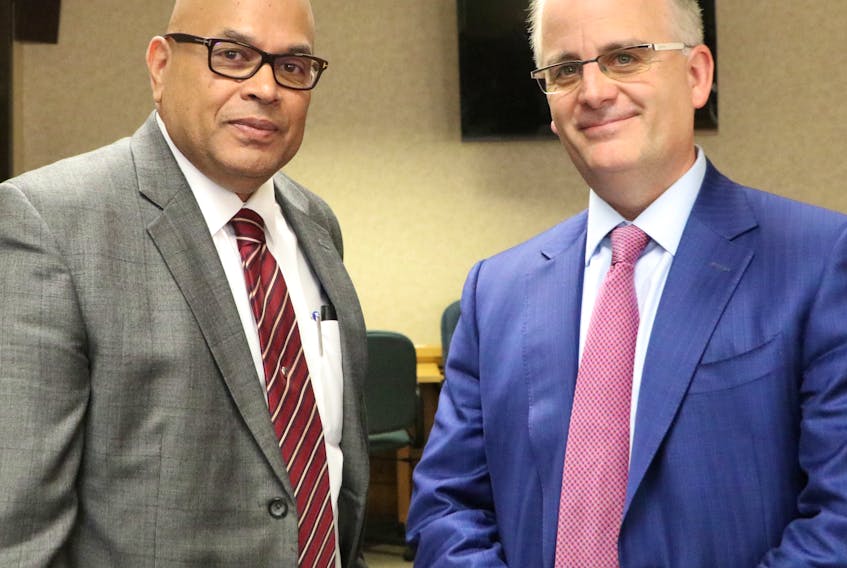Questions about the independence of the consultant hired by the Public Utilities Board (PUB) to assess the auto insurance industry in the province became a little too intense Friday for PUB chair Darlene Whalen’s liking.
Whalen halted the line of questioning and said it could only resume if a formal motion to deal with the issue was made and accepted.
“It appears to us that there has been an issue of independence raised with respect to Ms. (Paula) Elliott and while we’ve allowed the issue to be canvassed, I’m not prepared to let that proceed,” Whalen said at the public hearing.
“And if there’s anything else that the Atlantic Provinces Trial Lawyers Association would like to raise with respect to that, it will have to be done in the way of a formal motion with supporting documentation evidence, and we’ll deal with it.”
Nova Scotia lawyer Barry Mason, one of the lawyers representing the Atlantic Provinces Trial Lawyers Association, was questioning Elliott — principal actuary with Oliver Wyman — about the data used in her reports prepared for the PUB’s review of the province’s insurance industry, and about her independence in doing the reports given that Oliver Wyman’s parent company, Marsh and McLennan, conducts business with insurance companies.
“The concern is the provincial government has apparently ordered an independent review of insurance rates in this province and the board has hired an actuary whose parent company is Marsh and McLennan, and Marsh and McLennan does business with and profits off the insurance industry,” Mason said.
“So we’ve got an incestuous relationship where we’ve got the subsidiary of a parent who is doing a review of … the insurance companies that deal with the parent. That’s not the way an independent review should be conducted.”
Mason said the issue of independence is important in the review because the actuary is saying claims costs are going up significantly.
“The insurance companies have a way of hiding that money and making it look worse than it actually is by putting money into reserves,” he said. “Ms. Elliott of Oliver Wyman said today she is the one who determined what that reserve should be, so we have someone whose independence is being questioned who has the ability to manipulate — not saying she did — but has the ability to manipulate the numbers to make the profits look much lower than they actually are. That’s an issue, I think, that should be explored by all counsel here because you want to get the truth at the end of the day.”
Elliott took offence to the suggestion from Mason that she was biased in her reports. She said it is not a secret that Oliver Wyman is part of the Marsh and McLennan Group, but Oliver Wyman has no dealings with the insurance companies.
“I think what should be correct and that you should get correct is that I have been doing this work for Oliver Wyman for more than 20 years,” Elliott said. “My integrity has never been questioned in terms of presenting bias in any manner in our reports. We prepare the reports as thoroughly, completely and accurately and independently as we believe possible and appropriate. And I have no relationship whatsoever with any company, insurance companies or any concern of what Marsh and McLennan might be doing for any of its clients.”
The PUB was requested by the provincial government to review and report on a number of issues with respect to automobile insurance in the province, including the reasons behind increasing claims costs for private passenger vehicles and taxi operators, and options to reduce these costs.
The board was specifically asked to examine the impact on rates and implications for claimants of introducing a monetary cap on claims for non-economic loss for minor injuries, or continuing with the current deductible of $2,500, or increasing the deductible.
Public hearings were held all week and continue on Monday.
Lawyer Ernest Gittens said concern has been raised about the independence of the assessments done by Elliott and her company because the information they used came directly from the Insurance Bureau of Canada (IBC), a group that lobbies for the insurance industry in Canada.
“There has been no information indicating that that information was audited to make sure of its accuracy,” Gittens said. “You are going to get the fox to go into the henhouse to count the eggs and come and tell us what the correct number of eggs are. It’s simple. You don’t have the people who have an interest in the outcome providing you with the data which is not verified.”
Mason said that after a compensation cap on minor injuries was implemented in Nova Scotia, the profits of insurance companies “skyrocketed.”
Meanwhile, he said, the premiums for Nova Scotia consumers, over a five-year period, decreased by just 8.5 per cent.
“So what happens when these caps come in place is the insurers profit tremendously, they make an extraordinary amount of money, accident victims lose their rights and consumers see a negligible reduction in premiums. That is not a good deal,” he said.
“I’ve looked at the numbers and I’ve gone through this a number of times in Nova Scotia and in other jurisdictions. Nova Scotia and Newfoundland and Labrador had the same issues in the 2000s. Insurance companies said they were losing money, they said they were going bankrupt, they said they were going to leave the province. At that time — it’s become crystal clear now as we went through some of the data in Newfoundland and some of the data in Nova Scotia — they weren’t being truthful. In fact, they were earning record profits at that time.
“Here the industry is back again trying to take away the rights of accident victims in this province, making the same arguments they made before. In Nova Scotia we fell for it, and I think Newfoundlanders are a little smarter than we are and are taking a realistic view of this, that this is a problem. This is a story we’ve heard before from the insurance industry. We are not getting a really careful independent review of what’s going on in this province, and therefore we should put the brakes on this.”









